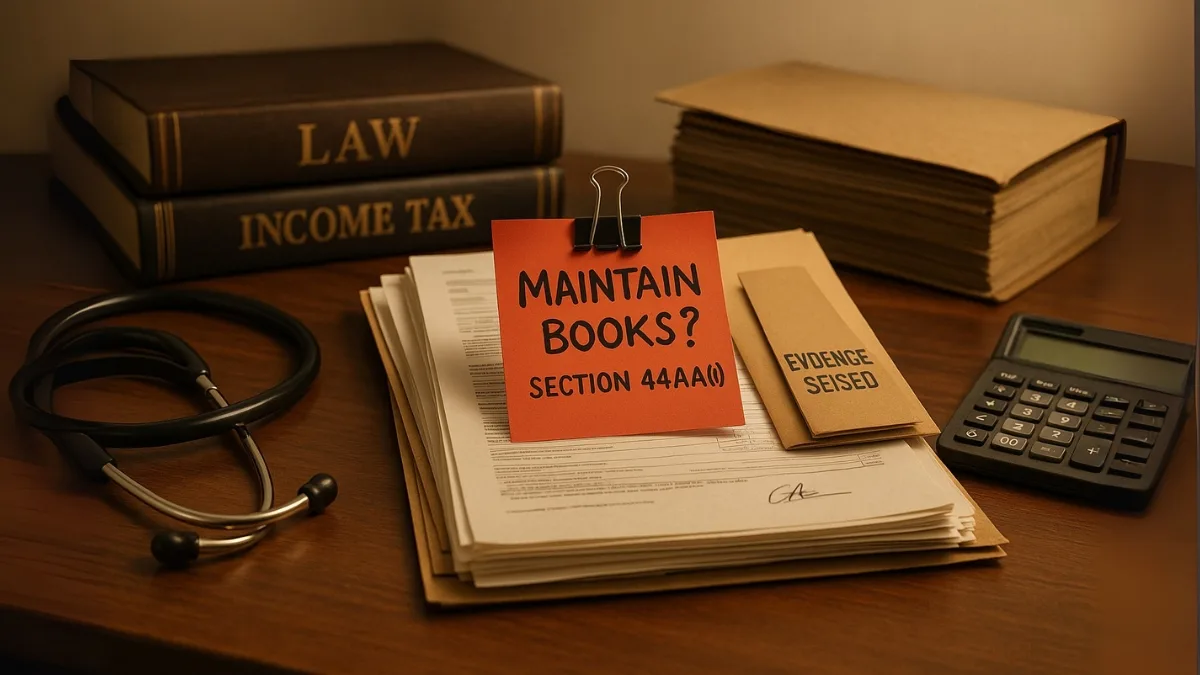
In the intricate world of taxation, one often-overlooked but crucial provision is Section 44AA(1) of the Income Tax Act, 1961. This section mandates the maintenance of books of accounts for specific professions. So, if you're a professional in legal, medical, engineering, or architectural services — listen up! This provision is not just a technicality; it’s a compliance must-have.
Let’s break it down in simple language so that even someone without a CA background can understand and stay tax-compliant.
🔍 What is Section 44AA(1) of the Income Tax Act?
Section 44AA(1) of the Income Tax Act, 1961 outlines that certain professionals are compulsorily required to maintain books of accounts. This includes:
- Legal professionals
- Medical practitioners
- Engineers
- Architects
If you are involved in any of these professions and your gross receipts exceed the prescribed limits, then you're required to keep & maintain detailed books of accounts.
🏥 Why Does This Matter for Professionals?
Imagine you’re a doctor or lawyer with a flourishing practice. You may believe your focus should only be on your clients. But the Income Tax Act 1961 thinks otherwise. According to section 44aa(1) of the Income Tax Act 1961 for AY 2018-19, maintaining records is not just recommended, it's mandatory.
The government needs transparency. Books of accounts help determine your actual income, applicable deductions, & help ensure that no income goes unreported. This keeps both you & the tax authorities on the same page."
📚 What Kind of Books Need to Be Maintained?
The rules don’t just stop at saying you must maintain books — they also define what needs to be maintained.
If you’re one of the professionals referred to in section 44aa(1) of the Income Tax Act, you’re expected to keep:
- A cash book
- Journal (if the mercantile system of accounting is followed)
- Ledger
- Copies of bills exceeding ₹25
- Original bills for expenditures over ₹50
- Inventory records, if applicable
Failure to maintain these could lead to heavy penalties under Section 271A of the Act. So yes, it’s serious business.
🏗️ Which Professions Are Covered Under Section 44AA(1)?
Here’s a clear view of the professions mentioned under section 44aa 1 of the Income Tax Act 1961:
- Medical (including dentists, surgeons, etc.)
- Legal (advocates, notaries)
- Engineering (civil, mechanical, software, etc.)
- Architectural
- Accountancy
- Technical consultancy
- Interior decoration
If you're unsure whether your profession falls under this, it’s best to consult a CA."
📈 Prescribed Limits Under Section 44AA(1)
The section applies only when your gross receipts exceed the limit of ₹1,50,000 in any one of the three preceding years. While this figure might look small, it’s intentionally kept low to ensure proper tracking of taxable income across all professionals.
Also, note that income tax section 44aa(1) is slightly different from section 44aa(2), which applies to other businesses and professions not covered under (1), but we’ll save that for another day.
💡 Real-Life Example to Understand Better
Let’s say Mr. Rao is a freelance architect. His gross receipts last year were ₹4,20,000. Since architecture is among the professions covered under section 44aa(1), and his receipts exceed ₹1,50,000, he must maintain books of accounts. If he doesn't, not only will he face compliance issues, but he may also have trouble filing accurate returns, claiming deductions, or defending his numbers during scrutiny.
📝 Summary Table for Quick Recall:
|
Requirement |
Applies To |
|
Section 44AA(1) |
Legal, medical, engineering & architectural professionals |
|
Threshold |
₹1,50,000 gross receipts in any 1 of the 3 preceding years |
|
Must Maintain |
Cash book, journal, ledger, bills, inventory (if applicable) |
|
Non-compliance |
Penalty under Section 271A |
🧠 Final Thoughts
Whether you are a medical practitioner treating hundreds of patients or an architect designing dream homes, section 44aa(1) is watching. Maintaining your books of accounts isn’t just good practice — it’s a legal necessity. And skipping it might cost you more than just penalties. It could impact your credibility and cause complications during scrutiny.
So don’t take chances with your tax compliance.
Confused about whether you need to maintain books under section 44aa(1)? Don’t worry! Just head over to Callmyca.com — our expert Chartered Accountants will guide you every step of the way!











